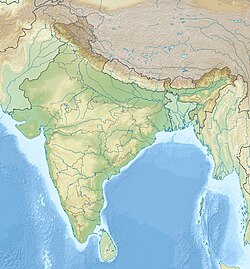The Upper Maleri Formation is a sedimentary rock formation found in Telangana, India. It is one of the formations of the Pranhita–Godavari Basin. It is of late Norian and possibly earliest Rhaetian ages (Late Triassic), and is notable for its fossils of early dinosaurs.
| Upper Maleri Formation | |
|---|---|
| Stratigraphic range: Norian ~ | |
| Type | Geological formation |
| Unit of | Gondwana Group |
| Underlies | Lower Dharmaram Formation |
| Overlies | Lower Maleri Formation |
| Location | |
| Coordinates | 19°18′N 79°30′E / 19.3°N 79.5°E |
| Approximate paleocoordinates | 33°06′S 36°24′E / 33.1°S 36.4°E |
| Region | Telangana |
| Country | |
| Extent | Pranhita–Godavari Basin |
Paleobiota
editColor key
|
Notes Uncertain or tentative taxa are in small text; |
Dinosauriforms
editAn unnamed guaibasaurid was present in the formation based on associated vertebrae, hip, and hindlimb material, specimens ISI R277. Two more indeterminate dinosauriform species are also known from the formation, based on specimens ISI R282 (a hip and three vertebrae) and ISI R284 (a right ilium similar to that of Nambalia roychowdhurii). Material from the formation has also been referred to Herrerasauridae.[1]
| Dinosauriforms from the Upper Maleri Formation | |||||
|---|---|---|---|---|---|
| Genus | Species | Location | Material | Notes | Images |
| Jaklapallisaurus[1] | J. assymetrica | Telangana | ISI R274, postcranial material[1] | An unaysaurid sauropodomorph, also found in the Lower Dharmaram Formation | |
| Nambalia[1] | N. roychowdhurii | Telangana | ISI R273, including partial postcrania of at least three individuals of different sizes found closely associated[1] | A basal sauropodomorph | |
Other amniotes
editPhytosaur fossils are known from the formation, including forms similar to Angistorhinus and Leptosuchus.[2] Indeterminate aetosaurs and dicynodonts have also been reported.[2]
| Non-dinosaur amniotes from the Upper Maleri Formation | ||||
|---|---|---|---|---|
| Genus | Species | Material | Notes | Images |
| Kranosaura[2] | K. kuttyi | ISIR 269, a partial skull | A dome-headed protopyknosian archosauriform, related to Triopticus from the Colorado City Formation of Texas | |
Temnospondyls
edit| Temnospondyls from the Upper Maleri Formation | |||||
|---|---|---|---|---|---|
| Genus | Species | Notes | Images | ||
| Compsocerops[3] | C. cosgriffi[3] | A chigutisaurid also found in the Santa Maria Formation[4] | |||
| Kuttycephalus[3] | K. triangularis[3] | A chigutisaurid[4] | |||
Correlations
editThe formation has been correlated with the Forest Sandstone of Africa, the lower Caturrita Formation of the Paraná Basin in Brazil, the upper Ischigualasto Formation and lower Los Colorados Formation of the Ischigualasto-Villa Unión Basin of Argentina, and the Chinle Formation of North America.[1]
See also
editReferences
edit- ^ a b c d e f Novas, Fernando E.; Ezcurra, Martin D.; Chatterjee, Sankar; Kutty, T. S. (2011). "New dinosaur species from the Upper Triassic Upper Maleri and Lower Dharmaram formations of Central India". Earth and Environmental Science Transactions of the Royal Society of Edinburgh. 101 (3–4): 333–349. doi:10.1017/S1755691011020093. ISSN 1755-6910. S2CID 128620874.
- ^ a b c Nesbitt, S. J.; Stocker, M. R.; Chatterjee, S.; Horner, J. R.; Goodwin, M. B. (2021). "A remarkable group of thick-headed Triassic Period archosauromorphs with a wide, possibly Pangean distribution". Journal of Anatomy. 239 (1): 184–206. doi:10.1111/joa.13414. PMC 8197959. PMID 33660262.
- ^ a b c d Sengupta, Dhurjati P. (1995). "Chigutisaurid temnospondyls from the Late Triassic of India and a review of the Family Chigutisauridae" (PDF). Palaeontology. 38 (2): 313–339.
- ^ a b Teschner, Elżbieta M.; Chakravorti, Sanjukta; Sengupta, Dhurjati P.; Konietzko-Meier, Dorota (8 September 2020). "Climatic influence on the growth pattern of Panthasaurus maleriensis from the Late Triassic of India deduced from paleohistology". PeerJ. 8: e9868. doi:10.7717/peerj.9868. ISSN 2167-8359. PMC 7485487. PMID 33194360.
Further reading
edit- Weishampel, David B.; Dodson, Peter; Osmólska, Halszka, eds. (2004). The Dinosauria (2nd ed.). Berkeley: University of California Press. pp. 1–880. ISBN 0-520-24209-2. Retrieved 21 February 2019.
